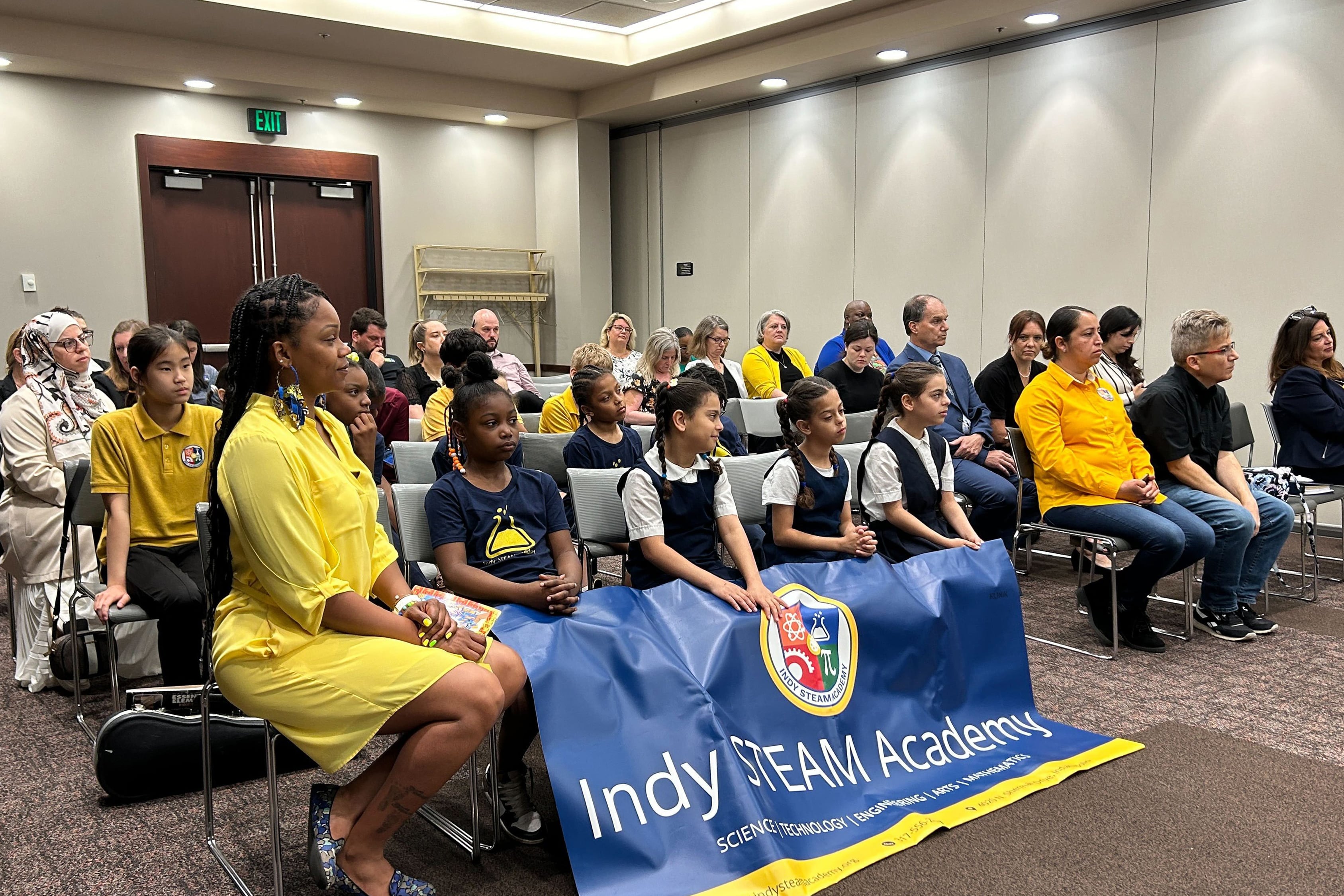Sign up for Chalkbeat Indiana’s free daily newsletter to keep up with Indianapolis Public Schools, Marion County’s township districts, and statewide education news.
The Indiana Charter School Board revoked Indy STEAM Academy’s charter on Tuesday while also approving the expansion of GEO Next Generation Academy on the same property.
The board’s vote to revoke Indy STEAM’s charter matched a recommendation from the charter authorizer’s staff, who cited problems with receiving financial information from the K-7 school, compliance concerns from the Indiana Department of Education, and the resignation of all but one of the school’s board members in February.
A charter school can’t operate in Indiana without approval by an authorizer.
The revocation of Indy STEAM’s charter could leave roughly 175 students in the Sherman Drive building searching for new schools over the next few months. Compounding that challenge for Indy STEAM students is that another charter school on the property, the Genius School, is moving to the city’s northwest side and is switching to private school status.
However, the expansion of the GEO Next Generation Academy, which includes grades 7-12, could provide an option for Indy STEAM families that want to stay at the same location.
James Betley, the Indiana Charter School Board’s executive director, said the board’s staff placed Indy STEAM on a corrective action plan in its second year of operation, 2022-23, as the authorizer struggled to get financial information from the school. He said Indy STEAM also has four open corrective actions from the Indiana Department of Education, but did not provide details during the meeting.
Before the vote, Indy STEAM founder Yvonne Bullock defended the school’s record. She told the state board that the school had hired consultants to assist with financial paperwork and other matters, as well as an accountant to create quarterly financial reports.
She also told Chalkbeat after the vote that the revocation of her school’s charter was a “political ploy” to allow GEO Next Generation Academy to take over the Sherman Drive property and grow, a claim Betley and Dana Teasley of GEO Academies denied.
After the charter board’s 6-0 vote to revoke Indy STEAM’s charter, Bullock said she would like to seek accreditation for Indy STEAM to become a private school. That decision would mirror the Genius School’s move, and could allow it to accept state-backed tuition vouchers.
Betley said the board’s staff tried to work with the school to bring it into compliance before Tuesday’s vote.
“This has an outsized impact on families and students, we’re absolutely aware of that,” he said. “But it is our job to make sure that these schools are held accountable, to make sure that they are actually functioning in the way that they’re meant to function under the law, even when it’s hard.”
Charter school founder admits struggles with paperwork
As its name implies, Indy STEAM focuses on science, technology, engineering, arts, and math. It advertises “hands-on learning” as well as after-school tutoring, competitions in robotics, and longer school days and years, among other things.
Indy STEAM opened in 2021. The state charter board approved its charter after the school’s application was twice rejected by another authorizer, Education One at Trine University. The school planned to grow to eventually serve grades K-8 in space it rented from GEO Academies Indiana Holdings.
The state education department did not immediately confirm the number of complaints it received about the school, or the nature of those complaints. But certain complaints can spur the department to direct a school to take corrective action.
But Princess Bandards, a mother of a student at the school, told the state board during a limited public comment period that she filed at least eight complaints with the state education department. She later told Chalkbeat her complaints addressed noncompliance with special education requirements, rules about suspensions, and the mistreatment of her son.
Bandards also cited concerns with the mistreatment of staff, and urged the board to look into the staff turnover.
“I am surprised there is not multiple lawsuits,” she said. “It is outright bullying.”
Bullock told Chalkbeat after the meeting that the school has responded to all eight of Bandards’ complaints. She also said she has a great relationship with staff.
Indy STEAM fourth grade teacher Brittany Gordon spoke in support of the school. One of her students also urged the board to allow Indy STEAM to stay open.
On the concerns raised by Betley about Indy STEAM’s financial transparency, Bullock told the state board that she struggled with balancing the day-to-day operations of the school with required paperwork for things such as federal funding.
“I don’t regret giving the time and attention to the students, my staff, and my team,” she said. “I’ve always sacrificed to make sure that Indy STEAM Academy could thrive and accomplish its mission.”
Describing the details of the mass resignation from the school’s board earlier this year, Bullock told the state charter board that one board member resigned after a “terrible conflict of interest” involving the board member’s daughter getting hired to work at the school. That board member resigned after Bullock released the daughter from employment.
Two other board members resigned after a plan to improve the school using a $100,000 consultant was rejected, she said.
The school now has a new board of directors.
Charter’s expansion could give new home to students
GEO Next Generation Academy opened as a high school in 2020. It advertises college and career courses as early as seventh grade and bus transportation, among other things.
The state board’s 4-1 vote (one member recused herself) to approve the school’s expansion plan means it could grow to serve K-12 starting next school year.
Despite the extra space that Indy STEAM’s closure would provide for GEO Next Generation on the Sherman Drive property, Betley emphasized the board’s Tuesday votes about the two schools were not “planned.”
But he said the move could give families an opportunity to stay in school in the same location.
“This would give them another choice, and another choice that would minimize disruption,” he said. “Obviously, it’s a different school, but it’s still the same location and that school, Geo Next Gen, has coexisted the whole time Indy STEAM has been there.”
Teasley, the president of GEO Academies, said she recognized that GEO Next Generation’s expansion would occur on a very fast timeline.
However, the school is ready to serve students left without a school like those at Indy STEAM and the Genius School, she said. GEO Next Generation has about 220 students, according to state records.
“Yes, it would be a different school,” she said. “However we would like the opportunity with your support to be able to offer them the ability to stay in the building they’re comfortable with, hopefully stay with their teachers, stay in their neighborhood.”
Amelia Pak-Harvey covers Indianapolis and Lawrence Township schools for Chalkbeat Indiana. Contact Amelia at apak-harvey@chalkbeat.org.







